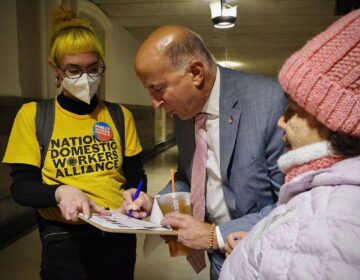N.J. domestic workers’ bill of rights moves ahead in the Senate despite GOP pushback
The legislation would provide privacy rights to domestic workers, and require employers and domestic employees to enter into a written contract.

The Statehouse in Trenton, N.J. is pictured in this file photo. (Mel Evans/AP Photo)
Advocacy groups in New Jersey are fighting for better working conditions for domestic workers like housekeepers, in-home cooks, and laundry workers.
The New Jersey Senate Labor Committee advanced legislation codifying domestic worker protections. Named the “Domestic Workers’ Bill of Rights, the bill would provide privacy rights to domestic workers, and require employers and domestic employees to enter into a written contract.
It would also establish penalties for companies that aren’t in compliance, including penalties for employer retaliation against workers, and create a state board to monitor the bill’s enforcement.
Domestic workers have historically been prone to abuse regarding wages and the terms of their employment, supporters say.
Reena Arora, senior policy attorney for the National Domestic Workers Alliance, says most workers are women of color and that many face gender- and race-based discrimination.
“Too often our workers are baited and switched, told to do one thing, then they have to do something else. They don’t receive the payment they deserve,” Arora said at a hearing on Thursday.
“They’re currently excluded from the New Jersey Law Against Discrimination as well as protections under Occupational Health and Safety. This bill seeks to put domestic workers on parity with other workers which is long overdue,” Arora said.
The Senate Labor Committee voted along party lines to approve the bill.
Sen. Mike Testa (R-Cape May) was one of two Republicans to vote against it.
“Domestic workers certainly deserve protection to prevent discrimination and ensure occupational safety, but like too many bills in this legislature, S-723 over-shoots the runway and goes too far,” Testa said in a statement Friday.
“For example, under the bill, a parent who regularly needs a babysitter to watch the kids must sign a written contract with the provider. If a neighbor mows the lawn every other weekend, that could be another written contract,” Testa continued. “But the devil is in the details. If those same workers provided the service for another family down the street but they didn’t get paid, S-723 could make their other clients liable to pay the money owed to them.”
The proposal now moves to the Senate Appropriations Committee but isn’t currently on the committee’s agenda for next week.
New Jersey would become the 11th state to pass such legislation.

Get daily updates from WHYY News!
WHYY is your source for fact-based, in-depth journalism and information. As a nonprofit organization, we rely on financial support from readers like you. Please give today.







